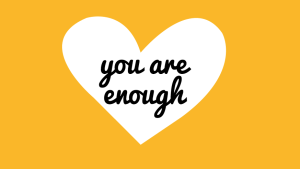
Source: Oldd Cassettes
With the passage of the new year, most consider the holiday season to be officially over. Almost overnight, we turn our focus to self-improvement.
I always feel a little bit of mood whiplash during this time of year. Whether you enjoy the holidays or not, it’s jarring to go from messages of selflessness and family to extreme self-criticism (especially because family can often trigger self-doubt).
The Western ideal of the “holiday season” is rooted in (predominantly Christian) middle-class values – namely, that everyone enjoys time off to celebrate the holidays with their families and then returns to work fresh and ready to begin the new year.
But what if you don’t consider the holidays a break?
Holidays can be a stressful time for many. The resulting strain can leave you feeling exhausted and resistant to starting your next chapter.
If you’re feeling holiday burnout, here are some self-care tips for the new year.
1. Validate Your Own Emotions
For me, one of the most stressful things about the holidays is that everyone is expected to be happy and excited and cheerful round-the-clock.
I’m never a pessimist for the sake of it, and if I’m happy, I’ll show it, but you can’t expect that 24/7.
The holidays seem to be the peak of emotional policing.
Show one sign of sadness or annoyance, and it’s like you’re a one-person Grinch parade hell-bent on ruining everyone else’s good time.
I think people also use this time of year as a crutch to avoid actually dealing with hashing out issues. You can’t be angry, it’s the holidays! You’re all supposed to be baking cookies and knitting sweaters together, right?
It’s inconsiderate to purposely try and bring others down, but that doesn’t mean that you can be banned from feeling a certain emotion. If anything, that repression makes you more bewildered and resentful.
If you spend the holidays in a lot of group settings, the performance of cheer gets old fast.
To unwind, try unpacking all of those suppressed feelings from the past month. Whether you’ve been angry with someone or you were reacting to a change in circumstance, you need to remind yourself that feeling those things was and still is okay.
We are so caught up with pleasing everyone else during holidays that we forget to prioritize ourselves.
You need to listen to yourself to begin the healing process.
2. Acknowledge That Traditions Don’t Have to Be Sacred
Unsupportive or toxic family members are difficult to deal with.
This can be a tricky area to navigate because truthfully, there isn’t a one-size-fits-all policy. Every family is different, and the way everyone reacts to their family is different.
You should never feel guilty or weak for loving your family even if they don’t accept you. You shouldn’t feel any pressure from anyone to break off family relationships just because they don’t subscribe to your exact ideological creed.
Kinship runs deep.
Sometimes things are better left alone and people can function perfectly well by mutually agreeing to exclude certain conversations from their dynamic.
At the same time, it’s totally within your right to cut ties with family who disrespect your gender presentation, sexuality, partner(s), profession, or anything else. No one wants the notion of romanticized family loyalty dooming them to misery year after year.
The societal mandate to remain obligated to and positive towards your family might damage relationships as well as your emotional and psychological health faster in the long run.
Your family can ultimately be the family that you choose.
It’s your decision.
3. Have Confidence in Who You Are
As a recent college graduate, I approached my family Christmas party dreading the inevitable question “So, what are you doing now?”
I’ve dodged countless social interactions throughout the fall to avoid giving a direct answer, and I knew that the holidays meant that it was time to pay the piper.
Given that my primary interests are social justice and media analysis, coupled with unemployment and a bona fide television addiction, I was downright embarrassed. I have had to come to terms with the fact that I have very few life accomplishments that are legible as such to the general population.
My vague responses elicited confusion and skepticism from my otherwise well-intentioned relatives. I am a people pleaser, and the lack of instantaneous approval admittedly made my skin crawl.
The things that I take pride in doing aren’t things that most other people understand. That stings.
For a few days afterwards, I threw myself into despair, fretting that I was throwing my life away and deluding myself into thinking I was exceptional enough to pursue my passions.
Then it dawned on me – it’s my life, so why the hell am I voluntarily cramming myself into the back seat according to everyone else’s whims?
You have to answer to yourself.
You are accountable for your own disappointments if you refuse to take an active role in sticking by your goals.
Although that may seem like a heavy burden on your shoulders, it can be liberating once you discover the power of your own agency.
What’s worse – mumbling your way through a few questions or getting stuck at a job you hate because you caved to the expectations of others?
Don’t let people chip away at your self-esteem. Even if you’re not quite sure what you’re doing in life, there’s going to be growth in the disorganization.
Have faith in yourself.
4. Do Whatever You Need to Do to (Actually) Relax
I always laugh at the idea that the holidays are supposed to be a relaxing break from the grind of reality.
Sure, some parts are fun, but to me, the season amplifies everything chaotic about life.
Holidays shove everything anxiety-inducing about social interaction into one room and literally wrap it with a bow.
Smile. Be polite. Talk to everyone. Don’t offend anyone. Don’t be offended. Give the right gifts. React correctly to the gifts you receive. Engage in extended conversation with people who you don’t see for months on end even if your knowledge of them only extends as far as your Facebook newsfeed.
Yikes.
We can all agree that the new year calls for a little pampering.
Maybe you spent time with your family and friends, maybe you didn’t. Maybe you liked it, maybe you didn’t. However your holidays panned out, it’s time to return to the roots of self love.
Stop overthinking or discrediting the little things that bring you joy.
Take a bubble bath. Watch a movie. Eat an extra slice of cake. Sign up for yoga class. Take a selfie. Do whatever makes you feel good about being you and living your life.
You made it through 2013, and you deserve a pat on the back. Treat yourself.
5. Approach New Year’s Resolutions with Caution
It’s absurd how much New Year’s resolutions have become commercialized. Just look at the huge jump in dieting and weight loss advertisements alone in the week or so after New Year’s.
When you consider a typical New Year’s resolution, it often calls us out on something we feel guilty about or ashamed of in an effort to discipline ourselves into becoming “better people.”
Most of them involve self-policing via self-deprecation or body negativity.
New Year’s resolutions are a running joke about the idealism of a fresh start quickly being squelched by the apathy of reality, to the point where designating something you want to change supposedly indicates your complete lack of a will to do so.
People try for a few weeks, get discouraged, and wind up making the same resolution the next year. They increasingly beat themselves up over not taking control of their lives, with the goal in question appearing more and more out of reach.
Needless to say, this isn’t a healthy cycle.
Even reactionary articles that critique the futility and unrealistic expectations of many New Year’s resolutions slide back into the same logic of needing to whip yourself into shape.
They set smaller and allegedly more attainable milestones, but it all still relies on the fundamental assumption that you constantly have to battle yourself to feel any sort of satisfaction.
That just isn’t true.
Who says that New Year’s resolutions have to be associated with correcting insecurities or negative qualities? Further, why do New Year’s resolutions have to be significant?
My New Year’s resolution is to cook fancier recipes and listen to myself more. It’s not really something negative or positive. It’s something that I’m going to quietly do in everyday life because I’m curious if it will encourage me to try new things. Plain and simple.
If you want to make a New Year’s resolution, that’s fine. If you don’t, that’s also fine. You don’t need a New Year’s resolution as an obligatory benchmark for your growth for progress.
You can also, you know, make resolutions throughout the year. January doesn’t have special privileges.
Change at your own pace and on your own terms.
***
The holidays are over. The new year is your new year. Take the time to take care of yourself so that you can enjoy it to the fullest.
Want to discuss this further? Login to our online forum and start a post! If you’re not already registered as a forum user, please register first here.
Erin Tatum is a Contributing Writer at Everyday Feminism. She’s a feminist, queer theory lover, and television enthusiast living in Pennsylvania. She is particularly interested in examining the representation of marginalized identities in media. In addition to Everyday Feminism, she’s also a weekly contributor to Bitch Flicks. Follow her on Twitter @ErinTatum91 and read her articles here.
Search our 3000+ articles!
Read our articles about:
Our online racial justice training
Used by hundreds of universities, non-profits, and businesses.
Click to learn more




















